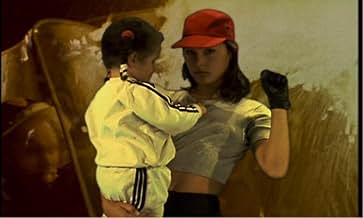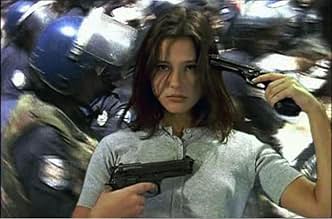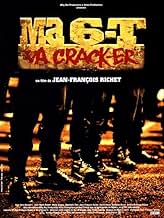अपनी भाषा में प्लॉट जोड़ेंYoung people and their chances of creating a loving life.Young people and their chances of creating a loving life.Young people and their chances of creating a loving life.
- निर्देशक
- लेखक
- स्टार
- पुरस्कार
- कुल 1 नामांकन
फ़ीचर्ड समीक्षाएं
10grocoman
Ma 6-T va crack-er is one of a rare breed: a genuinely rebellious movie. But also a movie with a strong political perspective: the perspective of true marxist-leninist communism, the idea that we have to build a revolutionary communist party and that - although the working class strikes remain the center of the revolutionary process - spontaneous violent resistance from the poor suburbs (the "banlieue" around Paris and other large French cities, with a great majority of immigrants) will be an important part of the revolutionary process. This movie also makes a strong point about violence between proles: it says that poverty makes you direct your violence against ill-chosen targets (rival gangs, ...), but that one spark can set the plain on fire, that one "incident" (the cops killing one youth, for example) can redirect the just violence against the true enemies: the state, the bourgeoisie, the cops.
exactly , that was the mistake of Jean Francois Richet, he tryed to mix hiphop and political convictions, the idea is smart, but youth in france are not followers... they tryed to make hiphop artist represent their propaganda to influence youth,,, but you also have to know that Jean francois Richet first movie was already a rebellious and destructive movie about ghettos in France...
its interesting to see this movie, but its is a point of view of whats happening in France, not what is really happening,,,
a movie like " THE HATE " from Matthieu Kassovitz , is way more realistic on this subject.
its interesting to see this movie, but its is a point of view of whats happening in France, not what is really happening,,,
a movie like " THE HATE " from Matthieu Kassovitz , is way more realistic on this subject.
After learning that some brave soul (fool?)was remaking Assault on Precinct 13, a seminal movie experience from my youth, I tracked down this earlier effort from Richet because he sounded like a fascinating director. There are some clear comparisons to be made in regard to this film and Le Haine, they share the same milieu and the focus is almost exclusively on the male protagonists. However, Ma 6-T feels more like a documentary at times, the style less obvious than that of Kassovitz. When the camera follows the players on a youth centre's basket ball court, the game deteriorates in to ugly gang violence and the viewer feels like an helpless spectator on the side lines, such is the ability of Richet's camera to draw us into the drama. This long take-the film is made up of a majority of these-is the kind of cinema that Andre Bazin would applaud, however he may have been less amoured to the occasional flourish, particularly during one scene where the circular motion of the camera feels more like an homage to DePalma. Richet clearly likes his characters (he his from the Paris projects)but unlike Le Haine there is more of them and thus they are less clearly defined, making it difficult to empathize with them. He does not give them any kind of arc, allowing for a more fly on the wall feel. This approach forces the viewer to consider their plight without having to fall for the winning charms of Vincent Cassel. Are they victims of society or just a bunch of losers? There is some suggestion that they are both, the few women portrayed in the film have jobs or are trying to better themselves, or more tellingly represent authority figures, like the female head teacher and police woman. The male characters just seem to complain about their lot without ever doing much about it, brilliantly conveyed during one scene by two of them pondering why they are sitting at a bus stop. Some of them talk of revolution but are more interested in their turf wars between rival project gangs, rather than joining together for a real class war. A riot seems to be the only possible conclusion but the film is bookended by the images of a women and a girl, presumably her daughter, raising arms. Is the future in the arms of the women? Perhaps so, because regardless of the obvious intelligence of the male characters, they are all oozing too much testosterone to care too much about the future and seem to enjoy a pretty vacant and violent now. This film gives me hope for the forthcomimg remake of Assault on Precincr 13, lets hope that Richet can apply as much intelligence to the remake as he did to this engrossing sophomore effort.
It is not a thriller nor a crime film, but a social, brutal, gritty but also a bit ankward social drama in the line of LA HAINE, or RAÏ, made two years earlier. But there is a thing that I can't realize, I can not believe, is that no one - even in France, on french movie blogs - no one has noticed that the previous Jean-François Richet's film: L'ETAT DES LIEUX, made two or three years earlier, was also a suburb violent social depiction. L'ETAT DES LIEUX was somewhere the prequel, the draft, of this one. Played in both cases, for both films, by mostly non professional actors - as also was LES MISERABLES - made twenty years later, those two features are mainly destined to suburb, ghetto audiences for whom it was a huge success, as also was SCARFACE, one decade earlier.
This film ( "ma 6-T VA cracker", word to word translation should be "my city's gonna crack" ) is a typical traditional realistic film, meaning not to seem real, but to "print" real. It is shot trough a dialectic materialist point of view. So it imply what this philosophy suppose : the analyse of the violence through the idea of possession and monopole of violence. You will remark, if you are a bit sincere, that when a film shows police officers ( that are represented as heroes or principal characters of the " good side " ) beating " criminals " in insulting them of " scum of society " or things like this, no one in the medias is talking about something like " provocation of hate ", even if it is. Even if Richet made the error ( to me it is an error ), to introduce this clip with red flag and Ak47, because it is a outing of the film, that stays only realistic, and threatening violence as what it is, without making a judgment, elegy or critique, on it. It's only what the last riots in France were : not especially politicized ( even if Richet, and I, I confess, should regret it ), not influenced by religious extremism in its globality, not even ruled by criminal business ( as much independent enquiries proved it, just because the big influence of criminal businesses didn't want general riots and other confrontation with police because it goes against this business ) just young poor enraged people fighting all together against the state, its system and its police even if it has no future, just to express there frustration and rage. In a way, it's like what happened in los Angeles in 1992, even if in France, ethnics are mixed, and so that were not only against racism of the system that french riots happened, but also about poverty ( a lot of the people that were arrested were french and white skincolored. ) In a way, I find that this film of Richet is closer to the realism tradition than " La Haine " ( the hate ) even if this last one is cinematicaly ( i hope this word exist ) better ( better directed ) : but less realistic.
क्या आपको पता है
- ट्रिवियाThe director Jean-François Richet made, two years earlier, another ghetto, suburb revolt film, which atmosphere and plot were close to this one: L'Etat Des Lieux. Some kind of a draft for Ma Ct Va Crack-er.
- कनेक्शनFeatured in Douches froides (2005)
टॉप पसंद
रेटिंग देने के लिए साइन-इन करें और वैयक्तिकृत सुझावों के लिए वॉचलिस्ट करें
विवरण
बॉक्स ऑफ़िस
- बजट
- FRF 70,00,000(अनुमानित)
- चलने की अवधि1 घंटा 45 मिनट
- रंग
इस पेज में योगदान दें
किसी बदलाव का सुझाव दें या अनुपलब्ध कॉन्टेंट जोड़ें




















